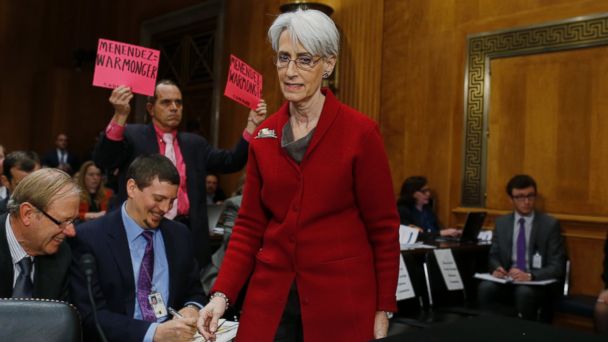US Sends Mixed Message on Doing Business With Iran

An anti-war protestor holds up signs as Undersecretary of State for Political Affairs Wendy Sherman arrives on Capitol Hill in Washington, D.C., on Feb. 4, 2014. (Charles Dharapak/AP Images)
Foreign delegations visiting Iran to talk business ahead of a final nuclear deal send the wrong message to Tehran about its temporary sanctions relief, two Obama administration officials said today.
But the officials themselves sent mixed messages during a Senate Foreign Relations Committee hearing, saying that while they'd prefer investors not go to Iran until a final deal is in place, those visits might actually help talks after all.
A temporary deal, signed in November between Iran, the U.S. and five other major powers, requires Iran to halt some of its uranium enrichment activities in exchange for a six-month loosening of some economic sanctions. The Obama administration has stressed that these concessions are limited and easily reversible, and that they don't mean Iran is yet open for business.
Undersecretary of State Wendy Sherman said that countries like France, which sent a 100-person delegation to Tehran on Monday to discuss potential business, could actually encourage the Iranians to stay at the negotiating table, even as they undermine the idea that Iran is still closed for business.
"Although we don't want people to go, because we think it does send the wrong message, if they do go, it puts pressure, perversely, on the Rouhani administration. Because as far as we have seen to date, there are not deals getting done, but rather people getting first in line in the hope that someday there will be a deal," Sherman said.
Countries such as the Netherlands, Germany, Italy and South Korea, have been taking advantage of the temporary sanctions halt, including those on Iran's auto and gold industries, while the interim deal is in effect.
Treasury Undersecretary David Cohen, who is in charge of sanctions, concurred, saying that while he was wary of trying to get inside the "psyche" of the Iranians, "there is perhaps a mixed message that gets to the Iranians on this."
"I think that can create within Iran a dynamic where the Iranian business community, which is desperate to re-engage with the world - they've been cut off from the world," he continued.
Mark Dubowitz, executive director of the Foundation for the Defense of Democracies, said Congress should have passed a bill, now stalled, sponsored by Sen. Bob Menendez, D-N.J., chairman of the Foreign Relations Committee, and Sen. Mark Kirk, R-Ill.
That bill would have imposed additional sanctions on Iran if the interim deal expires with no prospect of further talks.
Without that trigger in place, Iranians have no disincentive to exploit loopholes in the interim agreement, Dubowitz said, like they did with Turkey, signing an oil-for-gold exchange because the sanctions relief in place now loosened restrictions on the gold trade.
"Without that credible threat, we are going to start to see the macroeconomic data shifting in Iran's favor," Dubowitz told the panel.
He also noted that Russia may also sign a similar deal with Tehran. Over the weekend, executives from the Russian producer Lukoil reportedly discussed such a deal with the country's Iranian ambassador.
"Despite Undersecretary Sherman's assurances that everybody has read the riot act to [Russian President] Vladimir Putin, I am a little concerned that Putin isn't necessarily deterred by administration riot acts," Dubowitz said.